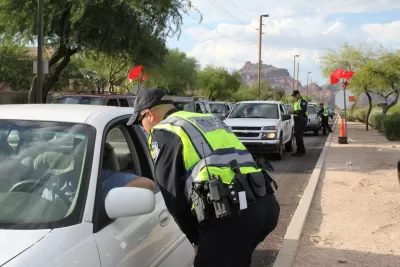The federal government is finally ready to explore technology that could saves thousands of lives every year on the highways and streets of the United States.

"[T]he National Highway Traffic Safety Administration quietly issued a request for information on late- or end-stage automotive technology that detects when drivers are impaired and prevents them from starting their cars," reports Kea Wilson.
The request is a very early preliminary first step toward the potential requirements for automakers to include potentially life-saving devices in vehicles, and, according to Wilson, "it’s a promising sign that the NHTSA is at least exploring the easily available solutions to our national drunk driving epidemic…"
There are many solutions to drunk driving made possible by technology that go far beyond a breathalyzer-actuated ignition. Alcohol detection technologies include on-board sensors to detect alcohol on the driver's breath or on the driver's skin. A concept car made by Nissan includes technology that detects erratic driving behavior consistent with drunk driving.
"But," writes Wilson, "like seatbelts and airbags before them, federal agencies like NHTSA have been reluctant to require the life-saving devices on new vehicles due to pressure from the auto industry, which does not want to pay the costs of implementing the reform."
FULL STORY: Feds to (Finally) Explore Drunk Driving Prevention Tech

Alabama: Trump Terminates Settlements for Black Communities Harmed By Raw Sewage
Trump deemed the landmark civil rights agreement “illegal DEI and environmental justice policy.”

Planetizen Federal Action Tracker
A weekly monitor of how Trump’s orders and actions are impacting planners and planning in America.

The 120 Year Old Tiny Home Villages That Sheltered San Francisco’s Earthquake Refugees
More than a century ago, San Francisco mobilized to house thousands of residents displaced by the 1906 earthquake. Could their strategy offer a model for the present?

In Both Crashes and Crime, Public Transportation is Far Safer than Driving
Contrary to popular assumptions, public transportation has far lower crash and crime rates than automobile travel. For safer communities, improve and encourage transit travel.

Report: Zoning Reforms Should Complement Nashville’s Ambitious Transit Plan
Without reform, restrictive zoning codes will limit the impact of the city’s planned transit expansion and could exclude some of the residents who depend on transit the most.

Judge Orders Release of Frozen IRA, IIJA Funding
The decision is a victory for environmental groups who charged that freezing funds for critical infrastructure and disaster response programs caused “real and irreparable harm” to communities.
Urban Design for Planners 1: Software Tools
This six-course series explores essential urban design concepts using open source software and equips planners with the tools they need to participate fully in the urban design process.
Planning for Universal Design
Learn the tools for implementing Universal Design in planning regulations.
Clanton & Associates, Inc.
Jessamine County Fiscal Court
Institute for Housing and Urban Development Studies (IHS)
City of Grandview
Harvard GSD Executive Education
Toledo-Lucas County Plan Commissions
Salt Lake City
NYU Wagner Graduate School of Public Service



























